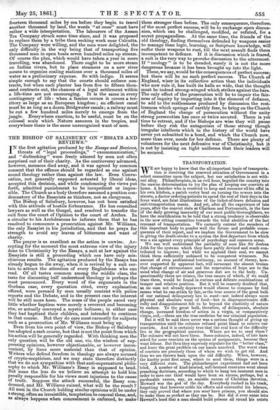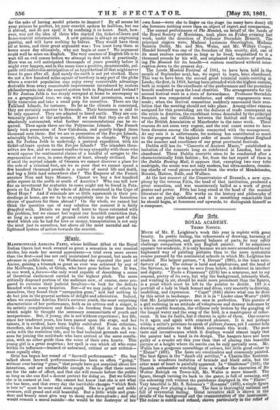TRANSPORTATION.
yr: are happy to know that the all-important topic of transporta- tion is receiving the renewed attention of Government in a select committee upon the subject, but our satisfaction is not with- out alloy. Philanthropists, in an evil hour, beguiled the country into the unwise determination to try the plan of keeping our convicts at home. A butcher who is resolved to keep and consume all his offal in his own kitchen, a parish vestry bent on turning the sewers into the streets, a doctor ordering patients to spend the rest of their days in the
fever ward, are faint illustrations of the ticket-of-leave delusion and anti-transportation mania. And yet, after all the experience of late years, idler the convict riots at Chatham and Portsmouth, in the face of the daily growing insecurity of our most public thoroughfares, we have the mortification to be told that a strong tendency is observable in the now sitting committee towards the total abolition of the last remnant of transportation. We earnestly entreat the members of this important body to ponder well the future and probable conse- quences of their report, and we implore the Government to be slow in giving the death-stroke to a system the first departure from which was a sin against every principle of psychology and common sense.
We can well understand the partiality of men like Sir Joshua Jebb for the systems which they have partly devised and much con- tributed to improve ; but while we applaud their zeal, we cannot think them sufficiently unbiased to be competent witnesses. No amount of even professional testimony, no amount of theory, how- ever supported by apparent fact, will surmount the almost truism that change of circumstance and the renovation of hope are to the mind what change of air and generous diet are to the body. Un- questionably there are crimes, the true causes of which, if we could trace them, would be found in curious and delicate combinations of temper and relative position. But it will be scarcely doubted that, sa no man not already depraved would choose to compass by foul means what he can attain by fair, so the true source of the great bulk of our national delinquency lies in wane—not indeed always mere physical and absolute want of food—but in disproportionate diffi- culty and disappointment felt to be beyond the elasticity of nature to endure. To the great bulk, therefore, of delinquents, absolute change, increased freedom of action in a virgin, or comparatively vi gin, soil,—these are the true medicine for our criminal population. But it will be said there never was a serious thought of giving up transportation until the colonies refused point blank to receive our convicts. And it is certainly true that the real knot of the difficulty lies in the geographical question. Where are we to send them I' The colonies will not have them. Some colonies, indeed, of late have asked for more convicts on the system of assignments, because they want labour. But then they expressly stipulate for the " better class," and leave the great problem on our hands unsolved. The worst class of convicts are precisely those of whom we wish to nott rid. And thus we are thrown back upon the old difficulty. When, however, the knotty point first arose, where to send them, things were in a very different state. The philanthropist experiment had not been tried. A number of kind-hearted, soft-brained creatures went about preaching doctrines, according to which to hang ten innocent men in order to save one thief would have been an excess, perhaps, but a pardonable excess, nay, an amiable excess of Christian devotion. Howard was the god of the day. Everybody rushed in his track, forgetting that however noble his efforts and successful his labours, they only proved that where you mud have prisons, you should aim to make them as perfect as they can be. But did it ever enter into Howard's head that a man should build prisons all round his estate for the sake of having, model prisons to inspect ? By all means let your prisons be perfect, let your convict .system be faultless, but use it abroa4 ,and. do not spoil it by confining it to home. Such, how- ever, was not the idea ot thoie who started the ticket-Of-leave and some-convict reformatories. A new passion is always an engrossing passion, and will have nothing by halves. They would have them all at home; and their great sigunient Was : You must keep them at home some day ultimately, why not begin at mice ? No argument mould well be more un-English. The Very essence of English life is to wait till an evil comes before we attempt to deal with it practically. Here was an evil anticipated thousands of years possibly before it might ever happen, and m the mean time a positive, demonstrable, pal- pable evil eedured in MitieiPation of an hypothetical ill that mightfiever come to pass after all. And surely the earth is not yet stocked. Have we not a few hundred Miles square of territory in any part of the globe Where a convict population may enjoy every conceivable advantage derivable from every Conceivable improvement introduced by zealous philanthropists into the convict syStem both in England and Ireland ? If Sir Joshua Jebb is too deeply occupied at home to accompany us on a geographical tour, we can, with his kind permission, make a little excursion and take a small peep for ourselves: There are tbe Falkland IelandS, for instance. So far as the elimite is concerned? they are certainly superior to Bermuda. Their barrenness is saidto he only apparent. They ate adapted to breed cattle. They are con- Settle/illy placed at the antipodes. If we add that they are all but ihsolately untenanted/ what furthei recommendations can be re- ipiired. Then again there are the Polynesian Islands. The French lately took possession of New Caledonia, and quietly lodged three thousand men there. But we are in possession of the Fee-je,e Islands, admirably fertile, lovely in scenery, delicious in climate. "Why not ask Sir JoShua Jebb to Undertake aPastoral expedition with his ticket-of-leave systeni to the Fee-jee Islands? The islanders thud- Selies are few, and we cannot confess to' any sympathy with those who would oppose the sentimental claims of a handful of savages to the regeneration of men, in some degree at least, already civilized. But if amid the myriad islands of Oceania we cannot discover a place for the sole of a criminal foot, are we so poor that we cannot spend a feli hundred thousand pounds in a matter Of moral life and death, and bly a little land somewhere else ? The Emperor of the French annexes Nice and buys Monaco. Cannot we buy a few hundred 'piles square in the north or south of America ? Who Can tell how fine an investment for centuries to come might not be found in Pata- gonia or La Plata ? Is the whole of Africa Contained in the Cape of Good Hope ? And if criminals are so little squeamish in their pro= ceedings at home, are we to be so exquiSitely nice in the Inicuriona ChoiCe of quatters fer them abroad? On the whole, we cannot but think the question one of easy solution the moment it is fairly tippled with. Details we may well leave to those entrusted with the problem, but we cannot but repeat our heartfelt Conviction that, so long as a spare acre of ground exists in any Other part of the world which can be had for love ot money, transpoitation is not only the most just to ourselves, but above all the most merciful and en- lightened system of action towards the convict.































 Previous page
Previous page